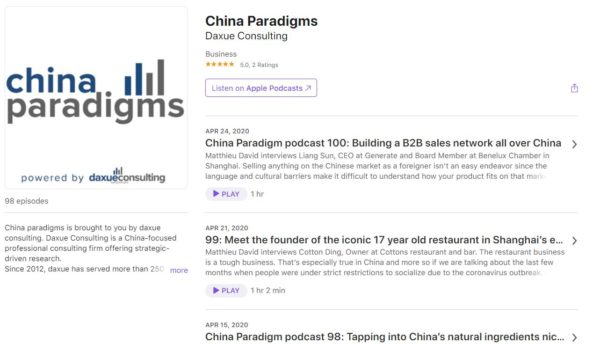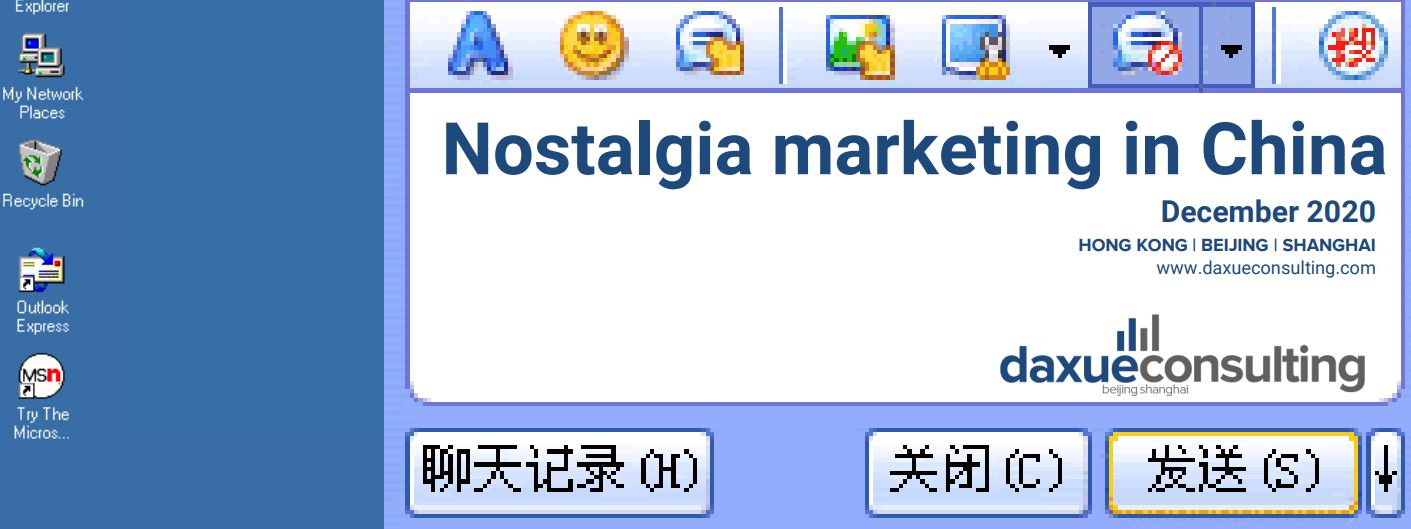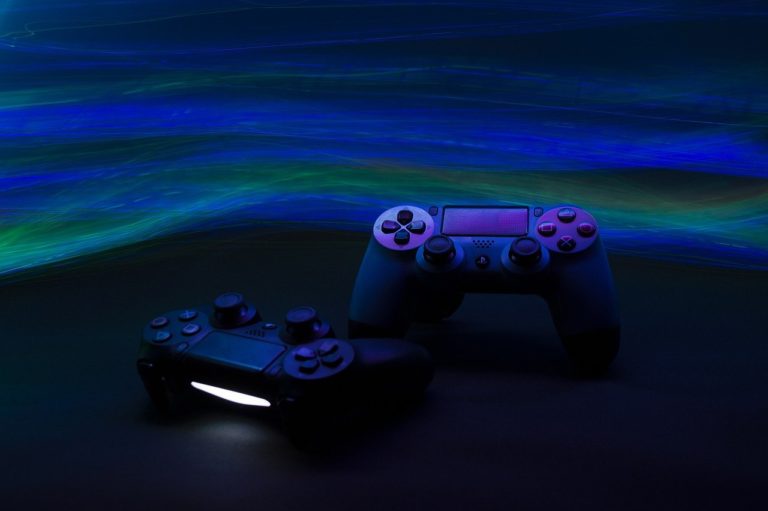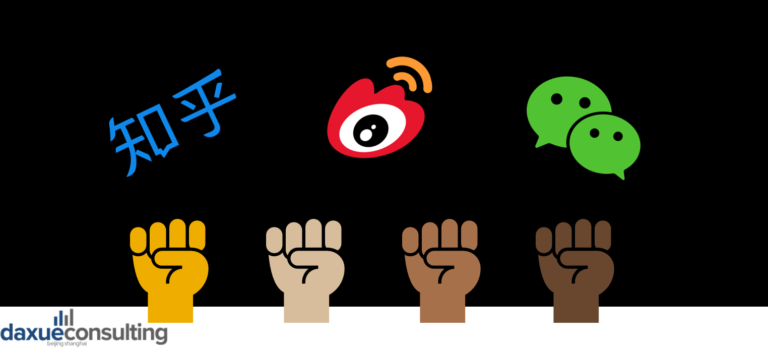Nostalgia marketing aims to capture customers’ attention by appealing to cherished memories. Nostalgia marketing is done through returning to concepts from an earlier phase in target consumers’ lives like family, holidays, and school, through triggers like music, tastes and images, or through pairing with popular brands, products and icons from childhood and early adulthood. From cinema to t-shirts to cookies, nostalgia marketing in China is making brands of all industries go viral. The question is, what is the sweet-spot for nostalgia in China? We conducted a series of in-depth interviews with Chinese millenials and gen Z to find the answer.
In hour-long nostalgia interviews asked questions like:
- What was your favorite cartoon as a child?
- Who was your childhood hero and why?
- What smells/tastes/sights come to mind when you think of home?
- Tell me about your first crush
And compared the answers against our findings from social media listening and nostalgia marketing case studies to uncover the deepest nostalgia triggers for young Chinese consumers.
How nostalgia works: why do we feel nostalgia?
Our brain’s “feel-good chemicals”, dopamine, serotonin and oxytocin are activated at higher levels between the ages of 12 to 22. This means that teenagers and young adults experience happy emotions more intensely, and these emotions are attached to music, sights, sounds and smells.
Four common nostalgia triggers
- Smells: The olfactory bulb, which is the part of our brain that processes smell, is a part of the limbic system and the emotional center of the brain. This is why smells often trigger nostalgia.
- Sounds: Music is one of the most common nostalgia triggers. Our brain is good at recognizing the sounds we have heard before. Music also lights up the visual cortex, making it closely linked to memory recall.
- Sights: We perceive 80% of impressions from vision. Most cultures believe sight is a dominant sense, and therefore most memories are recalled visually.
- Sadness: Negative feelings, like loneliness, often trigger nostalgia. However, nostalgia is shown to increase self-esteem and mood. Researchers believe that nostalgia is a resource to counter the negativity.
According to Dr. Alan R. Hirsch’s research, nostalgia is longing for an emotion, rather than an event. Nostalgia is not related to a specific memory, but rather to a specific emotion. The idealized emotion is framed within a previous era in one’s life. Emotions become displaced onto sights, sounds, smells and tastes that were experienced concurrently with the emotions. Experiencing sensory stimulation can trigger a longing for these idealized emotions.
Qualitative research on nostalgia in China
What comes to mind when Chinese millennials and gen z think of home?
In our in-depth interviews, most people mentioned food and eating when they think of home. Specifically, smells like, homemade rice, fried pork, braised beef, Osmanthus and soup can trigger homesickness.
Mother’s catchphrases and “nagging”, mother washing clothes and cleaning and mother calling dinner time are all connected with life at home. An additional sound that triggers nostalgia in China is educational English tapes.
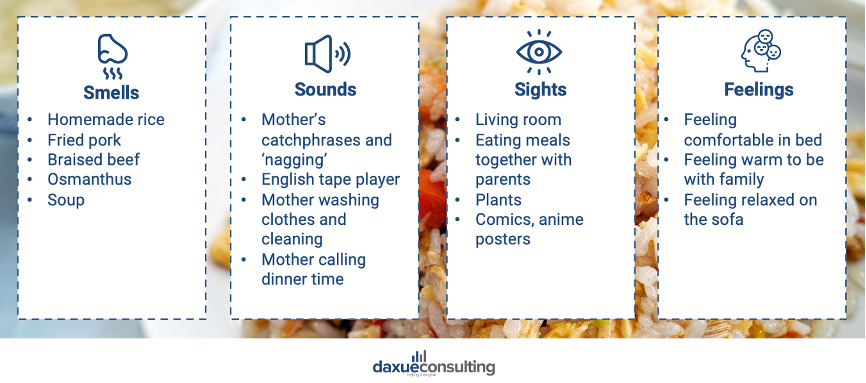
Data Source: Daxue consulting, What makes Chinese millenials and gen Z think of home?
How the nostalgia of home in China is leveraged in advertising
By leveraging the above four senses, Grace Towel launched a video campaign that triggers people’s nostalgia for home and their mothers. Grace Towel utilized all these elements in the short ad campaign that depicts a mother-child relationship through time. The beginning of the ad shows a child asking his mother for a towel, by the end of the four scenes showing both the son and mother growing older, the mother is no longer there to respond to the son asking for a towel.
The tear-jerking campaign appealed to Chinese young adults who grew up being “spoiled” by their mothers. The video was featured by many official accounts on Weibo, generating more than 2k shares.

Source: Weibo, Grace Towel TV commercial
What comes to mind when Chinese recall school days?
When talking about school life, most people recounted stories about friends and strict teachers. Fried meat in the classroom and in front of mini shops, fresh air and mini hotpots in dorms are foods most ate in their school life. Songs in school broadcasts, chatting with roommates at night, teacher’s angry and sharp voice, and Class bell are sounds most listened to during school life. Objects like uniforms, homework and stacks of books are sight boosts to the nostalgia.
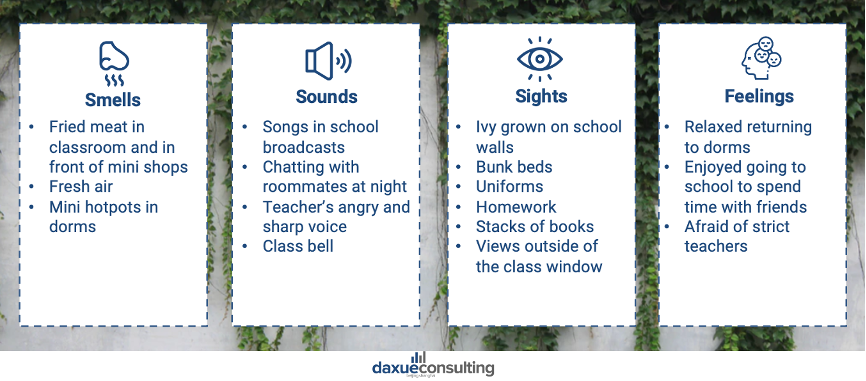
Data source: Daxue consulting, school days nostalgia in China
How products cater to the nostalgia of school days in China
With a wave of nostalgia for school life, school uniform photoshoots have become popular. On Xiaohongshu, 10,000+ search results show up for the query “Uniform Photos”. Most top posts have several thousands of likes. Uniforms were an integral part of Chinese high schools, and many people are willing to pay for school uniform photoshoots to re-live their school life.
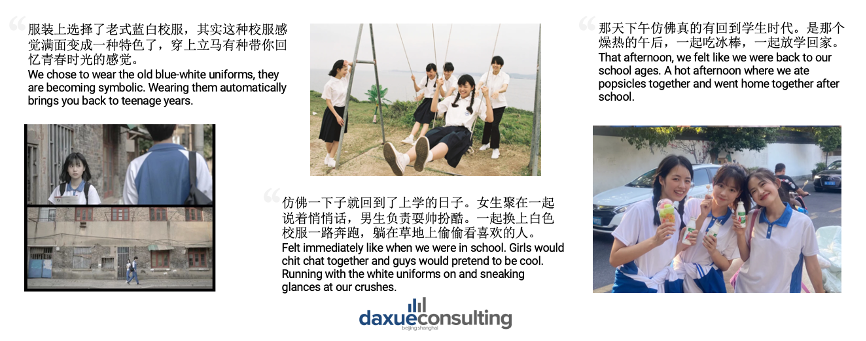
Source: Red, school uniform photoshoots, daxue consulting translations
What do Chinese millenials and gen z remember about exams?
Tests are an integral, if not the central, part of Chinese schooling. The intense pressure leaves a strong emotional imprint on Chinese people, even after they have grown up. As the most stressful events in many young Chinese lives, most remember the Gao Kao (Chinese national college entrance examination) as the single most influential exam in their life.
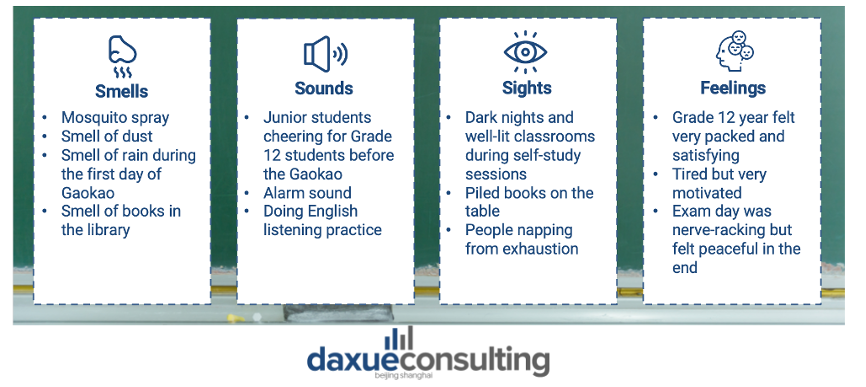
Source: Daxue consulting, what sensory stimulations are activated when Chinese millennials and gen Z think of exams
How exam nostalgia still impacts Chinese adults
Reviews of paid study rooms show that adults reminisce about time studying in high school. Chinese young adults felt most focused and motivated during their preparation for the Gaokao. Therefore, paid study room service is a rising trend among Chinese 20-30 year olds who want a quiet and low dimly lit learning environment that replicates the classroom seting where they spent hours on end studying for the Gaokao.
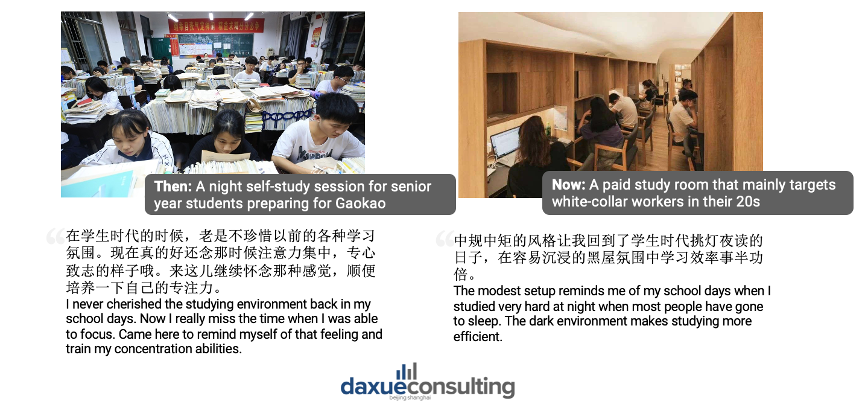
Source: Daxue consulting, reviews of paid study room service show users experiencing nostalgia
What reminds Chinese millennials and gen z of their first crush?
In our in-depth interview questions about first crushes, many people commented on how they concealed their relationships from parents and teachers.
When our female participants recalled their first-crush, they often mentioned “white-shirt” and “clean” in addition to “class monitors” and good students. On the other hand, when males recalled their first-crush, they often mentioned “fruity” and “sweet”.
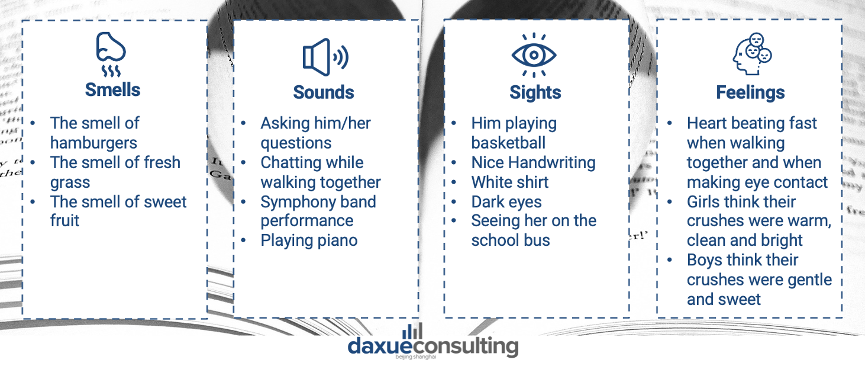
Data source: Daxue consulting, nostalgic memories of first crushes
How perfume and cologne brands resonate with first-love nostalgia in China
Perfume brands have caught on to these impressions and marketed their suitable products to attract consumers who feel nostalgic to these first-love moments. Sweet and light perfumes are often marketed as a “first-love scent”, reminding people of their crushes.
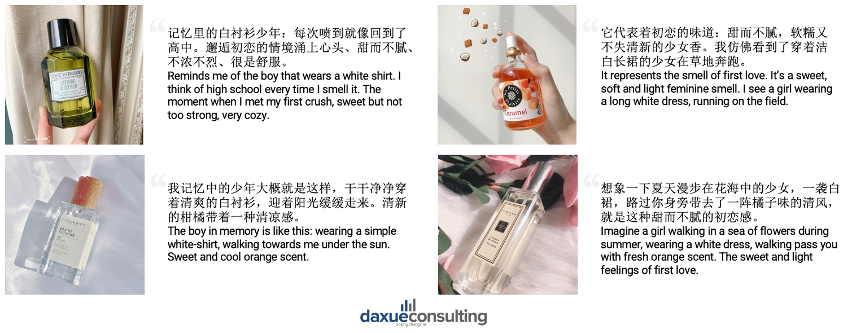
Data source: Daxue consulting, comments of sweet-scented perfumes bring up nostalgic feelings
What smells come to mind when Chinese think of childhood?
People from different regions of China have distinctively different nostalgia triggers when it comes to scents. .

Data source: Daxue consulting, each region in China has different associated with memories
What Chinese from the east region consider a nostalgic treat
Osmanthus season is memorable to those with roots in Eastern China. Osmanthus is native to Eastern China and is much celebrated in autumn when the aroma can be smelled in every corner of the cities. Therefore, many people recall Osmanthus as an integral part of their childhood. There are many commercial products in the market catering to people’s nostalgia for Osmanthus and the memories it brings.
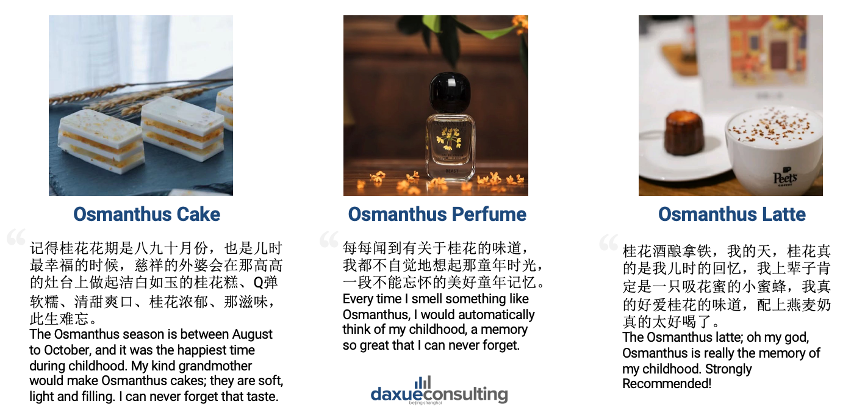
Data source: Daxue consulting, Osmanthus-related product
Nostalgic brands, celebrities and IP in China
Many nostalgia marketing campaigns double as co-branding in China. Therefore, our research dug deep to find out what brands and IP could be potential collaboration partners.
Nostalgic cartoons
Japanese anime was highly influential in the 90’s and early 2000’s China, but Chinese watched cartoons from many countries.
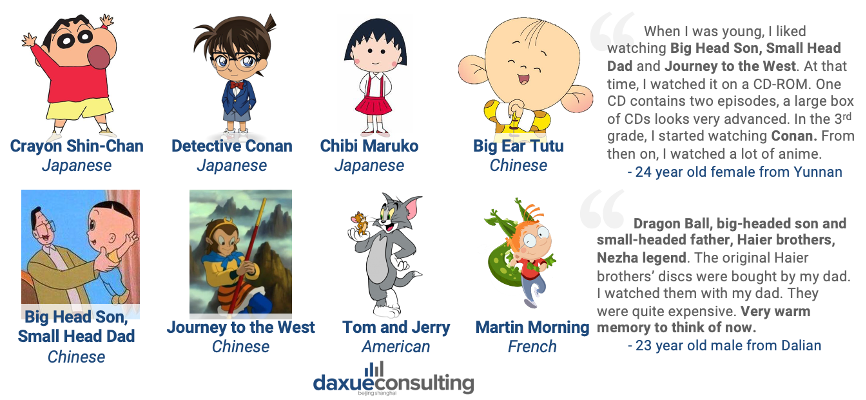
Data source: Daxue consulting, nostalgic cartoons among Chinese
Nostalgic movies
Many people fondly recalled their first time going to the cinema when talking about movies in childhood. Their movie tastes are not confined to Chinese movies. Japanese movie “Spirited Away” and Birth movie “Harry Potter” also bring back memories.
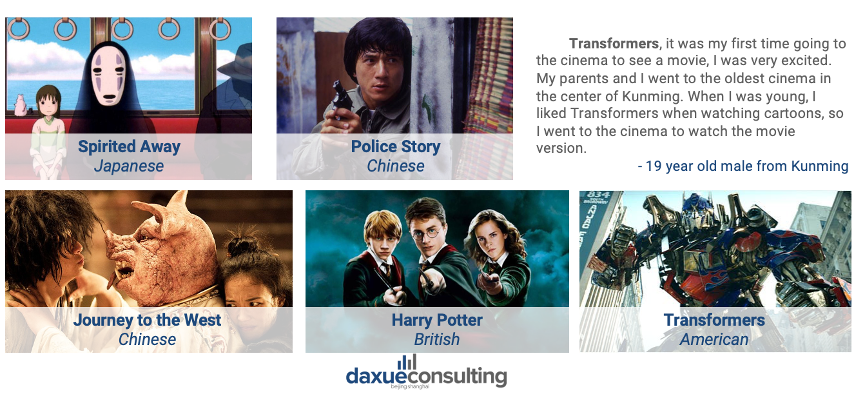
Data source: Daxue consulting, movies that trigger nostalgia in China
Nostalgic music for Chinese
Chinese millennials and Gen Z have a wide interest in music in the early 2000s. They enjoy listening to both Mandopop and foreign music.
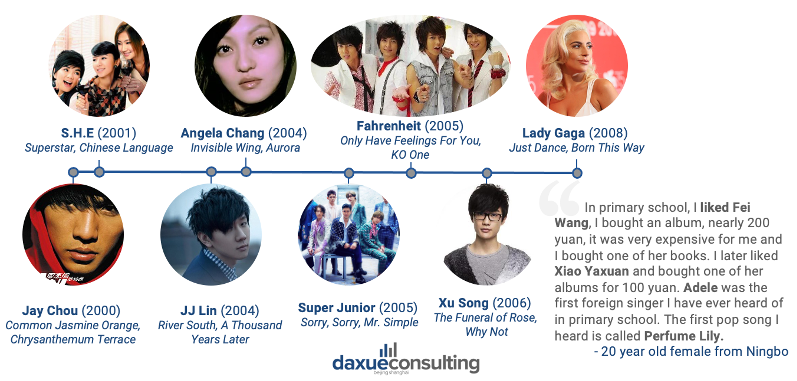
Data source: Daxue consulting, music artists associated with nostalgia in China
Nostalgic games
4399 mini-game and Tencent QQ were the two main Chinese video game platforms among the post-90s generation. During primary school study, many respondents said they would finish homework as early as they can to get more time to play computer games.
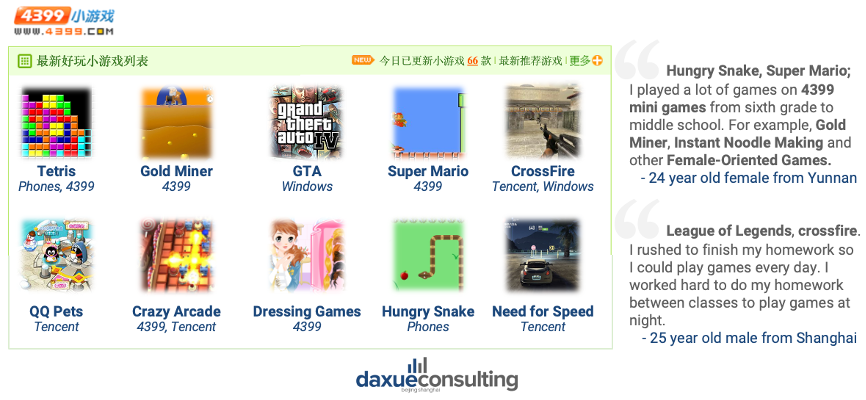
Data source: Daxue consulting, nostalgic video games among Chinese
Nostalgic snacks
When talking about snacks in childhood, most people recall snack brands bought from the small stores (小卖部) which were often in front of their schools. As an elementary school student, they used whatever tiny pocket money they spared to share snacks with friends after school.
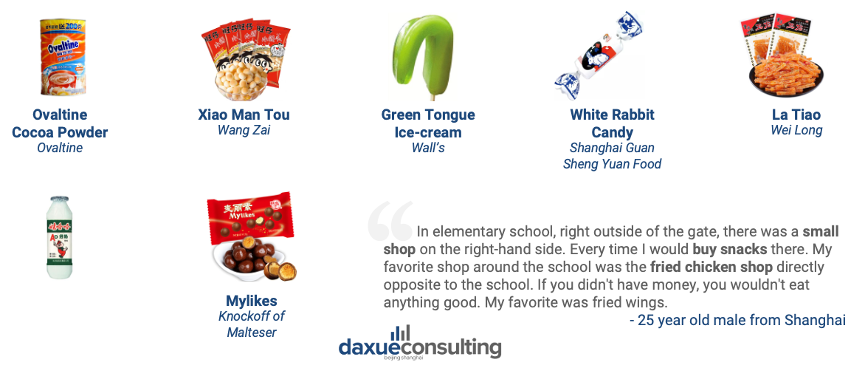
Data source: Daxue consulting, nostalgic snacks among Chinese
Nostalgic advertisements
Baby Gold Water, Taiji Cough Syrup, Naobaijin (Melatonin) and Haodi Hair Products are four famous ads wildly mentioned as the most memorable ads.
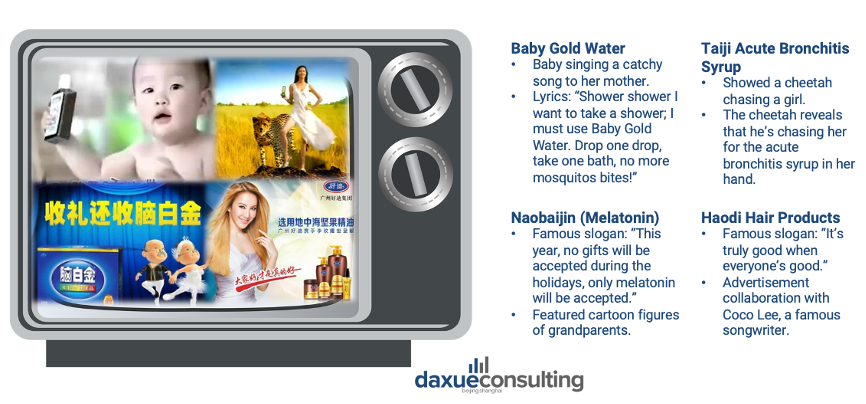
Source: Daxue consulting, nostalgic ads among Chinese
Nostalgia marketing case studies
These are just some of the successful nostalgia marketing campaigns in China. Because this marketing tactic is so successful in China, in addition to the ones below, we have even more nostalgia marketing case studies here.
These campaigns include co-branding with nostalgic IP, artists, and creatively captured Chinese millennials’ attention.
Harry Potter
Harry Potter remains to be a strong nostalgic presence for Chinese millennials and Gen Z. Many retail companies have collaborated with Harry Potter to launch limited edition items, which unleashes the magic of nostalgia. The Harry Potter World that will open in 2021 within Beijing’s new Universal Studios will continue to appeal to and grow these nostalgic sentiments.
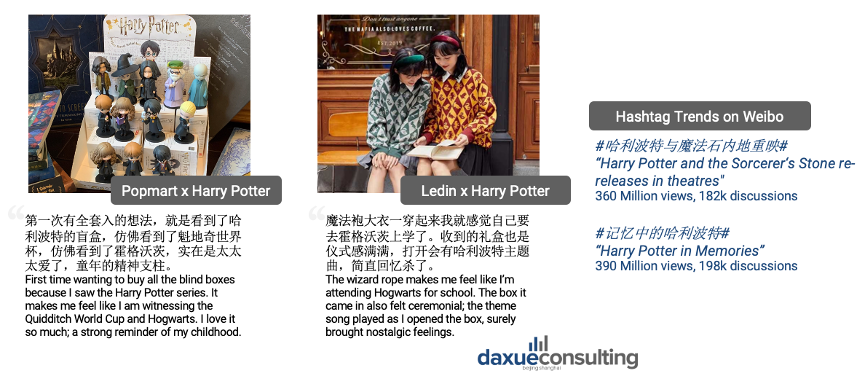
Data source: Daxue consulting, Harry Potter nostalgic co-branding in China
Super Mario
Super Mario expands its presence not only through new games, but also through collaborations. Unlike many other nostalgic IPs, Super Mario as a game has constant updates and remains a top-played game for Chinese youth and young adults. The brand is also looking for growth in other potential revenue streams. For example, on November 27th, 2020, Puma launched a collaboration line with Super Mario to celebrate Super Mario’s 35th anniversary.
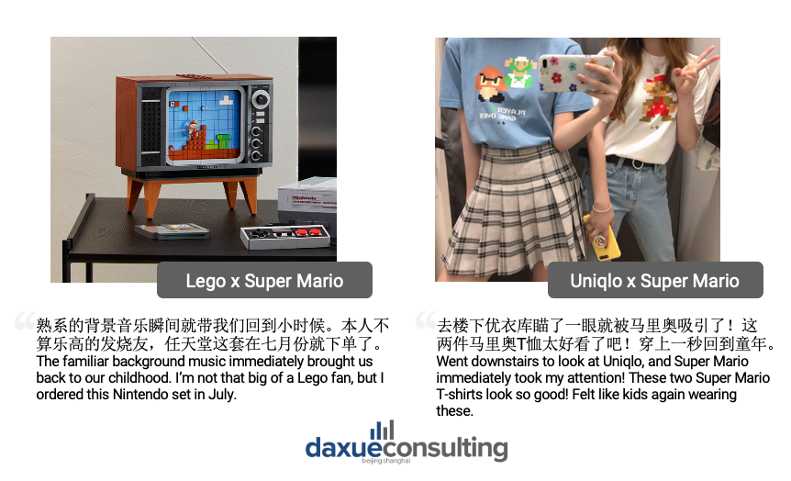
Data source: Daxue consulting, Super Mario nostalgic co-branding
Jay Chou + Oreo
Oreo entered China in 1996, while Jay Chou, a top Chinese celebrity, made his debut in 2000. Both Oreo and Jay have been in China for two decades and have a place in the hearts and minds of Chinese millennials. During Tmall Superbrand Day, Oreo announced Jay Chou as its spokesman, and created marketing campaigns focusing on playfulness and throwback hits.
Oreo’s campaign triggered most millennials’ nostalgia for Jay’s music and presented a good sales performance, increasing its brand awareness and brand voice. With over 3 billion views of the campaign, Oreo got more than 100,000 new followers on Tmall flagship store and grew 20% YoY in the transaction volume. The limited-edition music boxes sold out in 1 second.
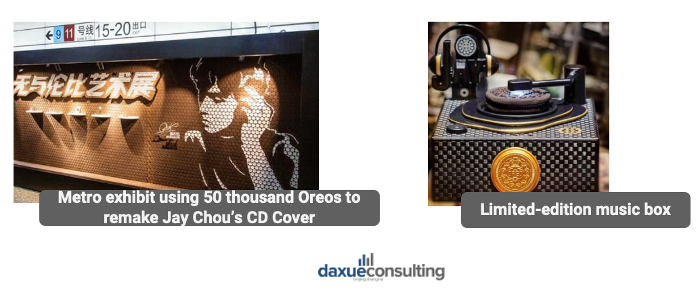
Dara source: Daxue consulting, Jay Chou nostalgic co-branding
Birth of the Demon Child Nezha
Nezha, a character based on Chinese mythology, was popular in the 90’s. Audiences appreciate Nezha’s filial piety, and even say Nezha was their childhood hero. The movie, “Birth of the Demon Child Nezha” was released on July 26th, 2019 and hit an all-time high box office among Chinese animated films. This record breaking movie also recalled audiences’ memories of the Nezha cartoon in Childhood.
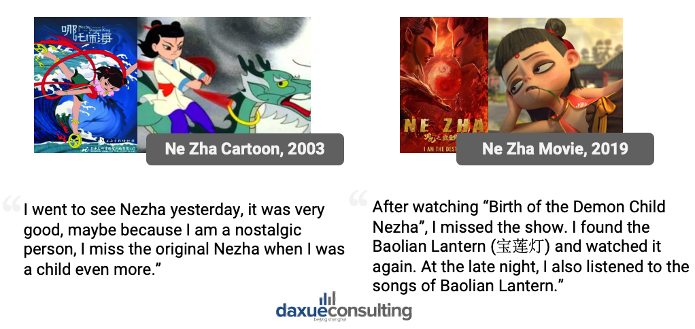
Data source: Daxue consulting, The Ne Zha cartoon was launched as a movie in 2019, setting box office records
Birth of the Demon Child Nezha maintained 20 days as the single-day box office champion since it released and harvested 5 billion RMB box office sales by December 19th.
White Rabbit – the queen of co-branding
White Rabbit is one of the most popular nostalgia co-branding IP. The has been doing aggressive co-branding tactics with brands ranging from clothing, to food & drinks, to cosmetics. It has partnered with both domestic and foreign brands that have a strong presence in China.
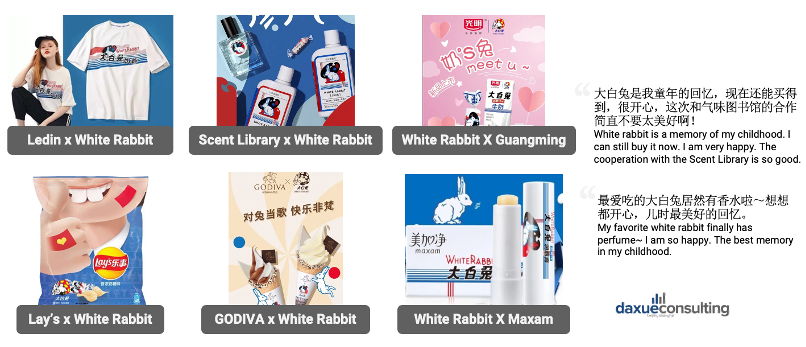
Data source: Daxue consulting, White Rabbit nostalgia co-branding
See our full report on nostalgia in China
Learn something new? Stay updated on the Chinese market by following our WeChat, scan the QR code below, or subscribe to our newsletter

Listen to over 100 China entrepreneur stories on China Paradigms, the China business podcast
Listen to China Paradigm on Apple Podcast
